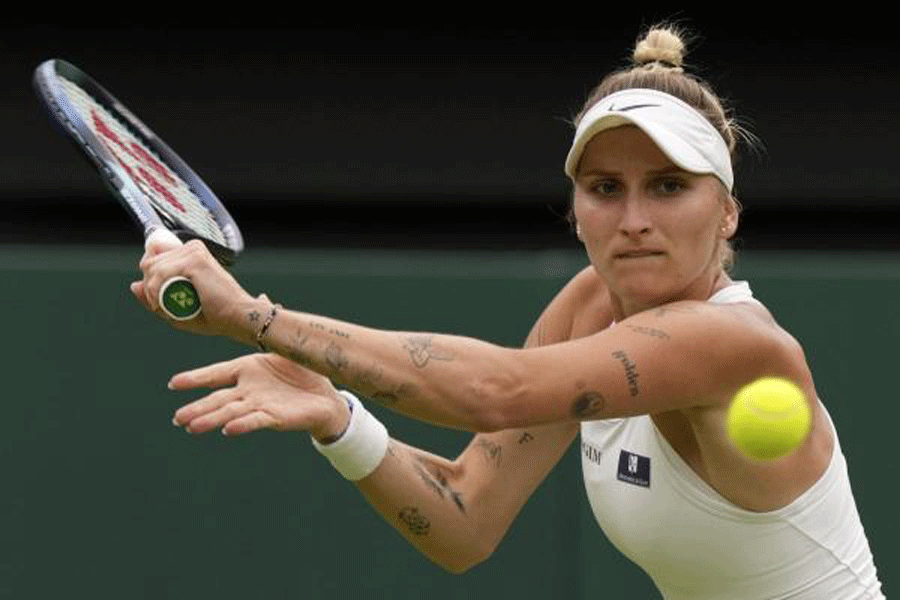When Thursday afternoon began, the Wimbledon women’s singles final held the possibility of featuring a new mother from Ukraine taking on a player seeking to become the first woman from an Arab country to win a Grand Slam singles title, or her facing a Belarusian in a match that would overflow with wartime tension.
When it was over, Elina Svitolina of Ukraine was out, but Ons Jabeur’s dream was still alive after her stirring comeback win over Aryna Sabalenka of Belarus. Sabalenka would have become the world No. 1 with a win on a hostile Centre Court, but instead, Jabeur, the crafty and athletic Tunisian, showcased her skills and plenty of grit in a 6-7 (5), 6-4, 6-3 victory.
That set up a date in Saturday’s final against an unlikely opponent, Marketa Vondrousova of the Czech Republic, who earlier in the day ended Svitolina’s improbable run in straight sets, 6-3, 6-3.
“Crazy match,” said Jabeur, a groundbreaking figure for the Arab world. “One more match to go.”
In Vondrousova, Jabeur will face an opponent with a deceptively slim résumé but a penchant for ruining sentimental narratives. At the Tokyo Olympics in 2021, Vondrousova eliminated Naomi Osaka, the national hero and international star who lit the Olympic cauldron at the opening ceremony, on her way to winning a silver medal.
Against Svitolina, she displayed all of the best skills that make up her varied game — wristy, rolling forehands; drop shots; and a thirst to move toward the net to finish points at every opportunity. Being left-handed also helped. It generally forces opponents to adjust to different spins than they normally face and to switch the direction of their attack in their efforts to get the ball onto her backhand.
A year ago, at Wimbledon, she was in a cast, recovering from wrist surgery and watching her friend and doubles partner, Miriam Kolodziejova, in the singles qualifying tournament before spending a week as a tourist in London.
Vondrousova, 24, had never made it past the second round at Wimbledon in four tries. Her game, though, bears a striking similarity to that of Jabeur, who also made last year’s final.
“I feel like we’re the same in some things,” Vondrousova said of Jabeur. “We’re playing drop shots. We’re playing slice.”
When Wimbledon began, there was plenty of chatter about the women’s game having a new Big Three in Sabalenka, Elena Rybakina and Iga Swiatek, the winners of the last four Grand Slam tournaments. All three are tall and powerful, and they often blow their opponents off the court.
The last two women standing, though, are Vondrousova and Jabeur, who beat Rybakina on Wednesday before toppling Sabalenka.
Jabeur, 28, came within a set of winning this tournament last year, and she received a hero’s welcome at the airport when she returned to Tunisia. She is the highest-ranked African or Arab player, male or female, in tennis history, and she has made no secret that a Wimbledon title is her dream.
Last year, a photograph of the women’s singles trophy was the background of her phone display. She has said there is a trophy on that screen once again this year, but she has not publicly said which one.
Jabeur, whose nickname is the Minister of Happiness because her almost always cheery demeanour and optimistic outlook can feel unique in an era when so many players struggle with their mental health, said looking at a trophy works for her.
“I like to know exactly what I want,” she said. “I know if I want that thing so bad, I will get it.”
The fans were with her from the first moments on Thursday, and especially against Belarusian Sabalenka. In recent days, as Sabalenka crept closer to the final, concerns rose over whether Catherine, Princess of Wales, who traditionally presents the trophy to the singles winner, would be forced to give it to Sabalenka.
Jabeur saved the monarchy from that uncomfortable outcome. She has knocked off four Grand Slam winners on the way to the final, surviving one of the toughest draws in the tournament and three three-set matches.
Now she is up against a player who has beaten her twice this year.
“I’m going for my revenge,” she said with a smile.
Vondrousova is one of a flurry of Czech talents. Last month, Karolina Muchova, 26, a friend of Vondrousova’s, fell two games short of winning the French Open. The country of 10.7 million people has eight women in the top 50.
Vondrousova is seventh among them at 42nd. Early on, she beat two solid players, Veronika Kudermetova and Donna Vekic, who have had success on grass. After that she thought she might be able to have some success, but still, the final?
“It’s really crazy this is happening,” she said. “But I think anything can happen in tennis.”
New York Times News Service











